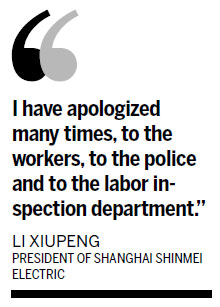Company agrees to worker demands
Updated: 2013-01-23 07:21
By Wang Zhenghua and Wang Hongyi in Shanghai (China Daily)
|
||||||||

Executives of a Japanese company made basic concessions to the demands of their labor force on Tuesday, after outraged workers trapped management staff, including 10 Japanese, in their offices when protesting against new regulations last week.
Eighteen management staff were stopped from leaving their offices by about 1,000 workers at Shanghai Shinmei Electric on Friday morning, and were not released until Saturday night when police managed to break through the crowd.
The company, which supplies switches and other components to electronics giants such as Sony, Sharp and Nokia, said it scrapped the proposed regulation that prompted the protest, and promised a pay raise.
"I have apologized many times, to the workers, to the police and to the labor inspection department," Li Xiupeng, the company's president, said at a meeting responding to the workers' demands on Tuesday.
"But not everybody is perfect. Who can be entirely free from error?" he added.
The protest was triggered by the new 49-item regulation proposed by the company that include terms that would have seen workers hit with fines of up to 50 yuan ($8) for being late for work, or using the toilet for more than two minutes at a time. Workers said they earn less than 2,000 yuan per month at the factory.
An official at the company's trade union, who declined to be identified, said on Tuesday that the regulations were only being proposed, but they were widely posted across the factory to "solicit public opinion".
Police detained seven people involved in the siege, with three of them remaining in police custody on Tuesday, according to the company.
The city's police and labor department declined to comment on the incident. Online posts claiming three female workers were injured during police intervention have not been verified.
The company said in a notice that operations will resume on Wednesday, and workers who arrive at work on time will each be rewarded 100 yuan cash.
Following the conflict, the management launched negotiations with employees at the same time the labor department intervened. A total of 800 questionnaires were sent to workers on Monday, and 261 had been collected by Tuesday.
Workers' demands hinted at the chaotic management at the company and tough working conditions.
The pay is low, subsidies are insufficient, and employees are forced to work on holidays, some workers wrote in their questionnaires.
Other violations of employees' rights included the abuse of supervision cameras in the factory, an improper role for the trade union and lack of communication between management staff and frontline workers.
There were even indications physical punishment had been used at the company, as Li warned the company's officials at the meeting: "It is unnecessary to use bad language or physically punish your workers. They should be treated with respect."
The two main demands from workers were better severance pay and avoiding retaliation against the workers who played a leading role in the protest. The company's management made concessions on both issues.
Tuesday's meeting lasted for several hours and involved more than 100 workers from the company, including all personnel above the level of section chief.
But several attendees approached by China Daily declined to comment on management's response.
These people, who are supposed to represent workers to make negotiations with the management staff, remained silent throughout the meeting, despite Li asking them to express their thoughts several times.
Lu Jingbo, a labor lawyer from Shanghai Jiangsanjiao Law Firm, said the conflict is typical of disputes between labor and management.
"Enterprises are entitled to introduce labor regulations and rules for their employees, but the content and procedures must be lawful," he said, adding that the right of enterprises to impose fines is still a disputed topic.
Founded in 1988, Shanghai Shinmei was co-established by Shanghai Feilo and Japan's Shinmei with a registered capital of 141.5 million yuan.
In 2010, Shanghai Feilo transferred its 30 percent stake to its Japanese partner, trading records showed. Due to the global economic downturn and fierce competition, Shanghai Shinmei reported losses in recent years.
Contact the writers at wangzhenghua@chinadaily.com.cn and wanghongyi@chinadaily.com.cn
(China Daily 01/23/2013 page5)

 In Photos: 7.0-magnitude quake hits Sichuan
In Photos: 7.0-magnitude quake hits Sichuan
 Li Na on Time cover, makes influential 100 list
Li Na on Time cover, makes influential 100 list
 FBI releases photos of 2 Boston bombings suspects
FBI releases photos of 2 Boston bombings suspects
 World's wackiest hairstyles
World's wackiest hairstyles
 Sandstorms strike Northwest China
Sandstorms strike Northwest China
 Never-seen photos of Madonna on display
Never-seen photos of Madonna on display
 H7N9 outbreak linked to waterfowl migration
H7N9 outbreak linked to waterfowl migration
 Dozens feared dead in Texas plant blast
Dozens feared dead in Texas plant blast
Most Viewed
Editor's Picks

|

|

|

|

|

|
Today's Top News
Live report: 7.0-magnitude quake hits Sichuan, heavy casualties feared
Boston suspect cornered on boat
Cross-talk artist helps to spread the word
'Green' awareness levels drop in Beijing
Palace Museum spruces up
First couple on Time's list of most influential
H7N9 flu transmission studied
Trading channels 'need to broaden'
US Weekly

|

|







